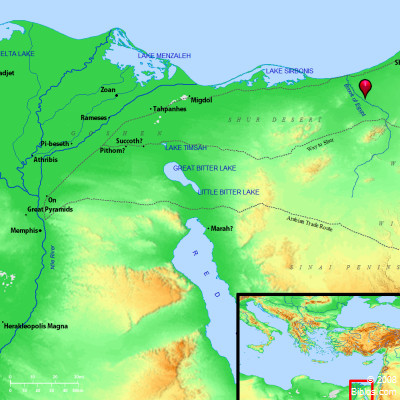Atlas  Shihor (Brook of Egypt) and surrounding region Maps Created using Biblemapper 3.0 Additional data from OpenBible.info Occurrences Joshua 13:3 from the Shihor, which is before Egypt, even to the border of Ekron northward, which is counted as Canaanite; the five lords of the Philistines; the Gazites, and the Ashdodites, the Ashkelonites, the Gittites, and the Ekronites; also the Avvim,Isaiah 23:3 On great waters, the seed of the Shihor, the harvest of the Nile, was her revenue. She was the market of nations. Encyclopedia SHIHORshi'-hor (shichor, also written without a yodh (y) and waw (w) in Hebrew and incorrectly "Sihor" in English): A stream of water mentioned in connection with Egypt. Joshua (13:3) speaks of the "Shihor, which is before Egypt," a stream which commentators have thought to be "the brook of Egypt," the stream which separated Egypt from Palestine, now called Wady el-`Arish. Jeremiah (2:18 the King James Version) says, "What hast thou to do in the way to Egypt, to drink the waters of Sihor?" Commentators have thought Shihor in this case to be a name for the Nile. Both interpretations cannot be correct. Whatever the name South means, at least it did not denote a movable river. It must be the same stream in both these passages, and no identification of the stream can be correct that does not satisfy both of them. Professor Naville has recently shown conclusively (Proc. Soc. Biblical Arch., January, 1913) that neither of these interpretations is strictly correct, and has made clear the Biblical references to South. In the northeasternmost province of ancient Egypt, Khentabt ("Fronting on the East"), was a canal, a fresh-water stream drawn off from the Nile, called in the Egyptian language Shi-t-Hor, i.e. "the Horus Canal" (the -t- is an Egyptian feminine ending). There have been many changes in the branches and canals from the Nile in the Delta, and this one with many others has been lost altogether; but there is a tradition among the Bedouin of Wady el-`Arish to this day that once a branch of the Nile came over to that point. This Shi-t-Hor, "Stream of Horus," makes perfectly clear and harmonious the different references of Scripture to South. It was "before Egypt," as Joshua describes it, and it was the first sweet water of Egypt which the traveler from Palestine in those days was able to obtain, as the words of Jeremiah indicate. "To drink the waters of South" meant to reach the supply of the fresh water of the Nile at the border of the desert. The two other references to South (1 Chronicles 13:5 Isaiah 23:3) are perfectly satisfied by this identification. The "seed of South" (Isaiah 23:3 the King James Version) would be grain from Egypt by way of the Shihor. |



